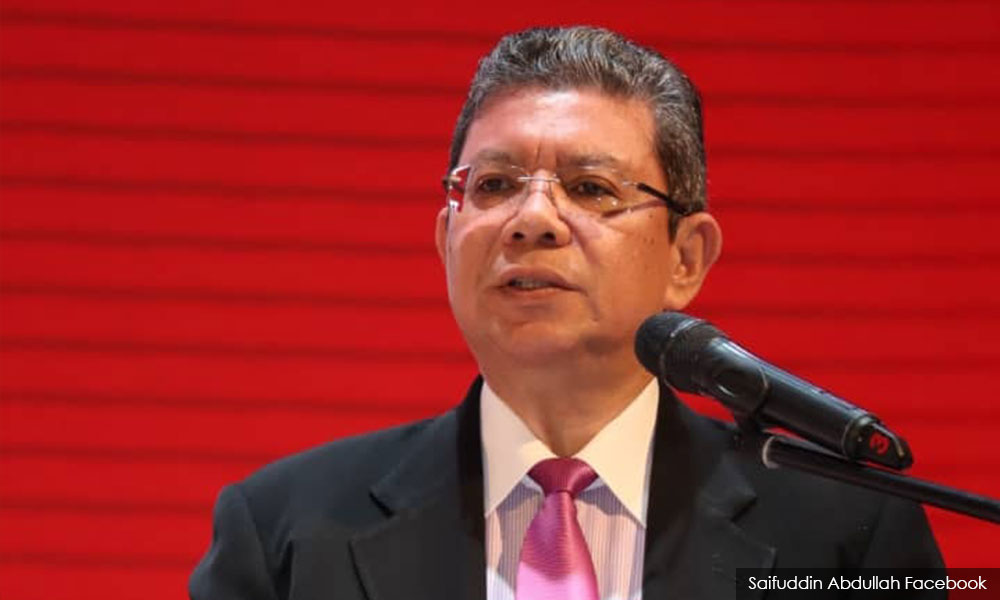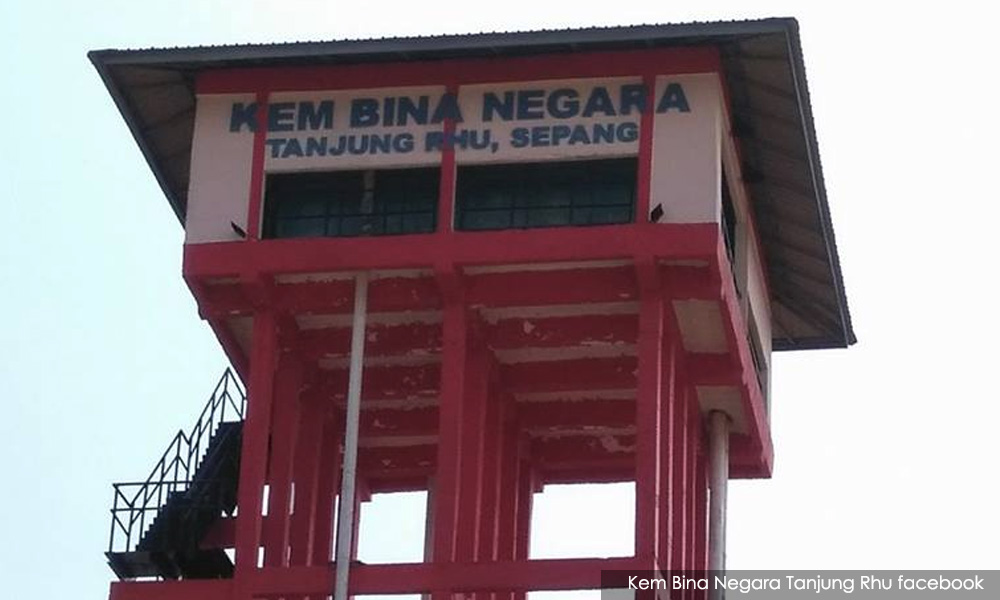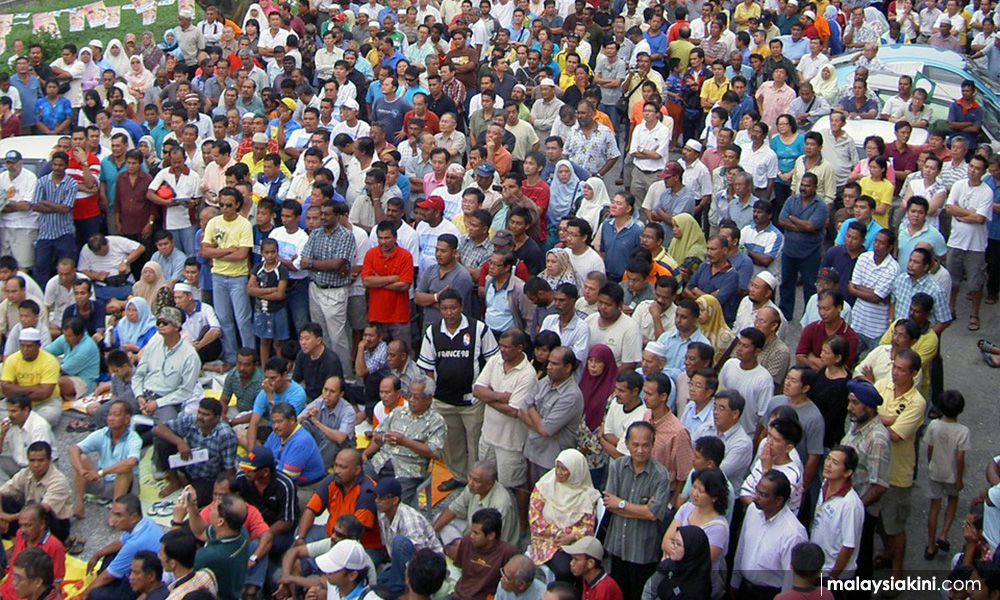
“Almost all people are hypnotics. The proper authority saw to it that the proper belief should be induced, and the people believed properly.” ― Charles Fort
Foreign Affairs Minister Saifuddin Abdullah’s (photo, above) warning that the “deep state” is out to undermine Pakatan Harapan’s reform efforts should be taken seriously but not for the reasons Harapan’s partisans think. Here is the thing, though. Is there a 'deep state' in the form that Saifuddin is referring to?
Not exactly.
In an article justifying Mahthir’s withdrawal from the Rome statute, I wrote that Saifuddin was right in that the 'deep state' was stymieing efforts for reform.
Rereading the piece, I made the mistake of legitimising the use of the term 'deep state' because it neatly fit my use of the term 'deep Islamic state' to describe the anti-democratic elements within the government whose agenda was to realise a theocratic state.
The 'deep Islamic state' benefits when people conflate it with something as nebulous as the 'deep state' (like I did) because it allows them to operate in an atmosphere where attention is diverted from the Islamisation process – knowingly or unknowingly – propagated by government apparatchiks and muddies the discourse when it comes to race and religion in this country.
The 'deep Islamic state' is non-partisan. It uses proxies from both coalitions – BN and Harapan – whose agenda is to realise a new Islamic project.
They have been in the system for decades and operate without oversight because the political apparatus has been involved in maintaining hegemonic control and because we have no independent institutions that offer any kind of oversight or curtails political power.

The 'deep Islamic state' is a result of the vast religious bureaucracy, the doctrinal teachings of propaganda endeavours like the Biro Tatanegara (BTN), the religious education system and foreign influence either through education or experience in foreign theatres of war.
What we are talking about here are 'travellers' who enjoy the support either knowingly or unknowingly of the Malay/Muslim political apparatus in this country, who believe they are setting the religious agenda but in reality, are being manipulated by anti-democratic elements with agendas of their own.
People often write jokingly of the corruption in the religious bureaucracy. What people may not understand is that these 'travellers' use corruption as a means to hide greater malfeasance through the disbursement of funds and no doubt dutifully compile compromising material on various religious figures.
Please do not confuse this element with the Umno/PAS opposition. The 'deep Islamic state' gets support from all political parties. Whenever a nanny state policy is injected into society, what it does is soften the public into complying with anything the government dishes out to them most often in the guise of partisan policymaking.
The nexus between the political apparatus and the 'deep Islamic state' is why I argued that Harapan is having so many problems (or so they claim) finding out what happened to the abducted Raymond Koh and Amri Che Mat. There is a state within a state – a religious one – acting without oversight and certainly which includes members of the state security apparatus.
One of the numerous ways they benefit is when non-Malay political operatives normalise anti-democratic behaviour. This was essentially what my last article was about. Whenever non-Muslim political operatives attempt to play the religious game, they are essentially playing a game rigged by the deep Islamic state which also benefits the Malay political apparatus in this country.
These days Harapan always blames the 'deep state' for every incompetent move they make. Agents provocateurs within the government, paid proxies, propaganda and the numerous other stratagems designed to sway public opinion are not the sole provinces of a 'deep state'. These methods are common political tools used by political operatives to sustain power.
When it comes to reforms purportedly disrupted by 'the deep state', can Saifuddin list the support it received from Harapan’s Malay political operatives? In other words, did Harapan’s Malay political operatives support these initiatives and how much campaigning did they do, to counter the propaganda against the Harapan government by Umno/PAS?

Saifuddin nearly gets to the root of the problem when he says Harapan has to come up with a counter-narrative. I say nearly gets there because what Saifudin fails to realise is that you can’t have a counter-narrative as long as there are Malay/Muslim political operatives’ claims that racial and religious superiority are embedded in the constitution of Malaysia.
The folks on the other side are not working for the 'deep state' but rather playing the same game that all mainstream political parties in Malaysia play.
And the 'deep Islamic state' benefits from this. It benefits when the state defines what is Islamic narrowly. It benefits when the state has power over the majority in this country and exercises its power through the religious bureaucracy. It benefits when the narratives of Malay Muslim political operatives are similar to the agenda of the deep Islamic state.
Saifuddin claims that the outrage from the 'deep state' seems fake. How does this outrage differ from Malays who are told their rights need to be protected by Malay-based parties and that their religion is under siege?
When Harapan’s religious czar directs the religious bureaucracy to investigate a dehijabing forum, is the outrage generated by the deep state or is it genuine? How can you tell?
Have you noticed that whenever Harapan backtracks on positions concerning human rights, they always claim that the public needs more education on the subject? Yet when they create laws that restrict free speech or deepen the fissures when it comes to religion - they assume Malaysians are educated enough to understand why these laws are needed.
The problem with illogical arguments is not that they come from the 'deep state' but rather they form the basis of the political discourse in this country. In what other country do arguments of racial and religious superiority taken seriously as a means to maintain stability either in the form of the social contract or Bangsa Malaysia.
As long as Harapan lacks the political will to carry out reforms, they will always blame this imaginary 'deep state'. The problem with not carrying out reforms is that all it does is embolden the 'deep Islamic state'.
In order to take on these anti-democratic forces in this country, Harapan has to committo serious reforms, many of which would lay bare the toxic confluence of religious, racial, royal and corporate power in this country.
S THAYAPARAN is Commander (Rtd) of the Royal Malaysian Navy. A retired barrister-at-law, he is one of the founding members of the National Patriots Association. - Mkini
No comments:
Post a Comment
Note: Only a member of this blog may post a comment.